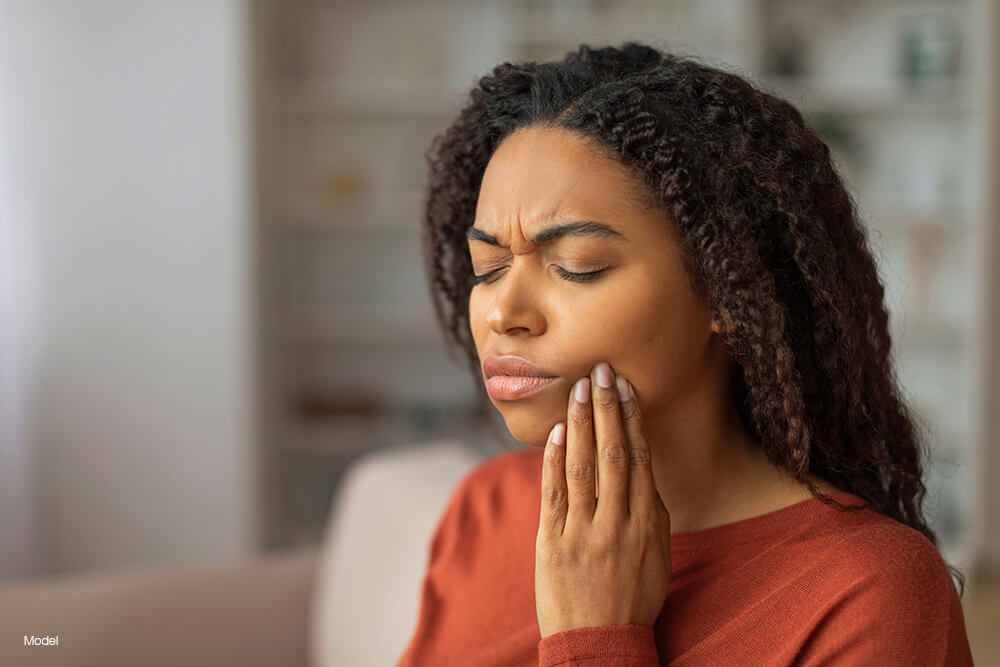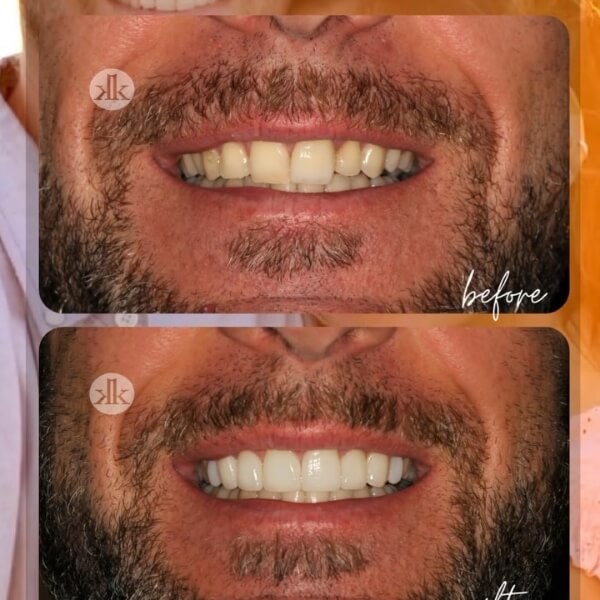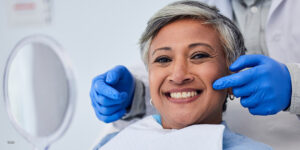
TMJ Treatment in San Diego, CA
Request a ConsultationMost people take a healthy jaw for granted until problems arise. TMJ is an acronym for the temporomandibular joint, which connects your upper and lower jaw to your skull at the front of your ears. A healthy temporomandibular joint allows you to open your mouth comfortably to talk, chew, yawn, laugh, or move your jaw up or down and side to side. TMJ is often associated with a type of temporomandibular disorder, or TMD, which is frequently misdiagnosed because its symptoms can be related to other conditions, such as migraines or certain dental issues. However, if TMD is diagnosed, treatment is available to help relieve your pain.
If you experience mild jaw pain or headaches, mention this to Dr. Kohani next time you visit La Jolla Cosmetic Dentistry & Orthodontics. Depending on whether you suffer from moderate, severe, or chronic discomfort, make a special appointment at our San Diego dental office so Dr. Kohani can evaluate you for TMJ disorder. He can perform diagnostic testing to determine if you are suffering from this condition and provide the best treatment option.
“At our practice, we do not cut corners. We only use the most advanced, cutting-edge equipment available.”rn— Dr. Kohani
How It Works
What Is the Process for TMJ Treatment?
Step One
If you experience symptoms of TMD, schedule a consultation at La Jolla Cosmetic Dentistry & Orthodontics by calling (858) 295-0603 or using our online contact form.
Step Two
Meet with Dr. Kohani for a dental exam and TMD evaluation. Making a list of your symptoms and noting when they are at their worst will help Dr. Kohani understand your condition.
Step Three
Dr. Kohani will assess you for bruxism (teeth grinding), examine the alignment of your teeth and jaw, and obtain detailed images.
Step Four
Treatment options are explained and include braces or aligners, crowns, tooth replacement, and BOTOX®. Nightguards can help protect your teeth and may alleviate TMD. Severe cases may require surgery.
What Happens During Your San Diego TMD Consultation?
During your consultation with Dr. Kohani, he will perform a dental exam, obtain images with a 3D digital CT scanner, and discuss the symptoms you are experiencing. He will also examine your jaw to listen for any pain or popping sounds and your muscles to see if they are working correctly.
The goal is to rule out other underlying conditions that could be causing the problem, and if Dr. Kohani diagnoses you with TMJ disorder, he can begin treatment. Depending on the specific cause, he will recommend the following treatments:
- Bruxism – If tooth grinding has caused the problem, a nightguard can prevent the consequences of this often unconscious habit.
- Misshapen or small teeth – If bruxism has led to worn-down teeth and problems with your bite, Dr. Kohani may advise you to have crowns placed to restore your teeth to their original shape.
- Orthodontic issues – Crooked, crowded, and misaligned teeth can also interfere with your bite, in which case, braces or clear aligners like Invisalign® can help.
- Missing teeth – If a gap in your smile is to blame for your TMJ disorder, an implant or dental bridge may help solve the problem.
- Strained muscles – When overuse or stress has caused repeated muscle contractions, BOTOX® can be an excellent solution.
In rare cases of severe TMD, surgery may be needed to correct the issue.
-
Can TMD Be Treated With BOTOX®?
In treating TMD, the intent is to retrain the jaw muscles to become properly aligned when in use and at rest. BOTOX® injections are a temporary muscle relaxant used to alleviate jaw tension and keep the muscles from contracting.
BOTOX® is typically injected into the temporalis, frontal, and masseter muscles to improve the symptoms associated with TMJ disorder. This treatment usually takes no more than 30 minutes to receive, will last for roughly six months, and can be performed right in Dr. Kohani’s office.
Combining BOTOX® with other corrective measures can deliver ideal results in patients with complex TMD. BOTOX® injections do not affect surrounding muscles that are not contributing to this condition.
-
Is There Downtime Associated With Treatment for TMJ Disorder?
Depending on the type of treatment needed to correct your TMD, there may be no recovery period involved at all.
- Nightguards and clear aligners are not associated with any downtime.
- BOTOX® injections may lead to temporary redness, and you may be instructed to stay upright for a few hours.
- Restorations like crowns or bridges may result in some soreness lasting up to 24 hours.
- Dental implants require oral surgery and some downtime. Several factors will determine the length of your recovery.
- Other surgical procedures will also include downtime.
-
What Results Can I Expect After TMJ Treatment?
It may take some time for final results, including complete pain relief, to be achieved. Nightguards and restorations can provide relief within weeks to months, and orthodontic treatments or dental implants often take up to a year. BOTOX® injections tend to offer the fastest results.
Testimonials
Our patients LOVE us, and you will too!
Dr. Kohani changed my smile by using his special veneering technique with minimal alteration of my own teeth. He is an absolute perfectionist and does unbelievable work. No one can tell I have veneers; they just notice my bright and shining smile.
I have gone to Dr. Kohani a few times now and have had nothing but great experiences. I was impressed with the friendly staff that is welcoming and organized. We all know these visits aren’t necessarily ones we look forward to, but Dr. Kohani makes this experience quite pleasant…
I was new to La Jolla, out looking for a dentist and I actually walked into Dr. Kohani’s office by mistake. Well, it was one of the best mistakes I made. My teeth needed a ton of work and Dr. Kohani did a beautiful job. I needed fillings, root canals and veneers. Dr. Kohani was able to do it all…
TMJ Disorder & Treatment FAQ
What are the causes of TMD?
A TMJ disorder can be caused by many things, including injury or trauma to the jaw, causing the joint ligaments to stretch or the articular disc to be displaced. TMD can also be caused by arthritic conditions or stress-induced jaw clenching. In addition, some people clench or grind their teeth while sleeping (bruxism), which can cause TMJ problems. Hormones may also play a part, as TMD is most common in women aged 30 to 50.
How are TMJ disorders diagnosed?
Dr. Kohani will listen to the patient’s description of their symptoms and perform a thorough dental examination. Patients may also be assessed for other problems in their jaw, face, neck, shoulders, or head. Some patients also require imaging studies such as X-rays, radiographs, MRIs, or CT scans.
What causes headaches associated with TMJ disorder?
People with jaw problems, like TMD, often complain of headaches. This is because the condition creates tension as the temporal muscle is implicated. Many patients clench their jaw or grind their teeth without realizing it, making the temporalis muscle overactive and leading to pain, discomfort, and tension in the temples.
Medical professionals often refer to these headaches as ‘tension headaches’ or ‘muscle contraction headaches.’ Sufferers report that a tension headache feels like their head is being held with a vice. You may also feel a dull or achy pain or regularly experience throbbing headaches. If you frequently wake up in the morning with a headache, it may be due to teeth grinding and clenching at night.
Try not to resort to over-the-counter painkillers for an extended period, as this may mask the true symptoms and delay proper treatment. In addition to headaches and jaw pain, neck or shoulder pain and ear ringing may indicate a problem with your lower jaw.
My jaw clicks. Should I be worried?
Having a clicking jaw isn’t automatically cause for concern. However, it’s worth having your jaw and teeth looked at by a dentist. You may be surprised to learn that 30 to 50 percent of people have a clicking jaw.
Treatment isn’t usually necessary unless you also have jaw pain and other symptoms that would indicate a TMJ disorder.
I’ve recently been fitted with a jaw splint, but the pain has gotten worse. What should I do?
Many different types of splint designs and other TMD treatments are available. Some splints may initially aggravate the TMJ disorder or change your bite. Your TMD symptoms may get worse over the short term before they get better, as the splint may have slightly changed your jaw’s position.
If you are worried about your symptoms or suffer from severe pain, you should see a dentist as soon as possible.
Jaw splint therapy works best in conjunction with other treatments. You may consider BOTOX® injections to help relax the facial muscles and ease TMD. It’s also a good idea to become aware of jaw habits and try to correct them. For example, you may be clenching your teeth during the day.
Is it true that some musicians are more prone to developing TMD?
It is documented that some musicians, particularly those who play the violin or a wind instrument, are more prone to developing TMJ disorders. This is due to tensing the muscles in the jaw and face for long periods.
Expert TMJ Treatment in San Diego, CA
If you think you have TMD, contact La Jolla Cosmetic Dentistry & Orthodontics by calling (858) 295-0603 or completing our online contact form to schedule a comprehensive consultation and examination with Dr. Kohani.
Patient Portal Login













